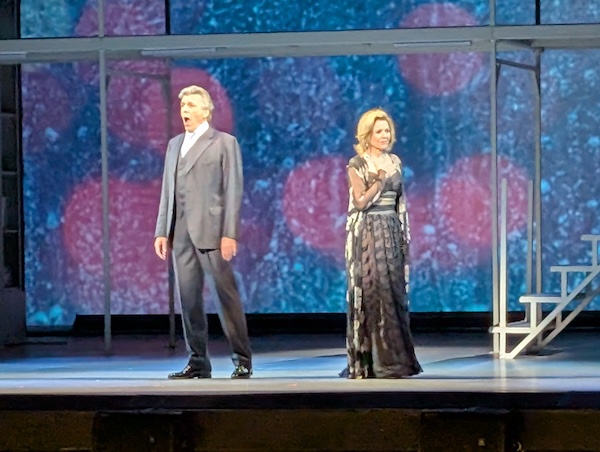WNO offers a spirit of unity in gala night of American music

Thomas Hampson and Renée Fleming performed at Washington National Opera’s gala of American music Saturday night at the Kennedy Center. Photo: C. Downey/WCR
Washington National Opera’s annual gala continued Saturday night with a concert devoted to American music. Renée Fleming, Denyce Graves, and Thomas Hampson anchored the evening, fixtures with the star power just to stand on the stage in formalwear and sing. Throw in a bevy of Cafritz Young Artists for ensemble fun and some Broadway song and dance, and all you need are the cocktails and heavy appetizers.
The point of the gala, chaired this year by Eva and Marc Stern, is to raise money. The event over-achieved in that department, raising $1.5 million, a nice addition to the extraordinary endowment gift of $8.6 million from the Dallas Morse Coors Foundation, which is dissolving this year. WNO has pledged to dedicate a “standard repertory opera production” each season to the memory of Dallas Morse Coors, beginning with Aida this coming fall.
While a second night of many empty seats in the Kennedy Center Opera House caused concern of ongoing patron boycotts at the venue, the musicians, as they always do, encouraged the setting aside of potential worries and conflicts. What could be more unifying and reconciling than an evening devoted to American music? As WNO artistic director Francesca Zambello put it in her opening speech, “We take the word ‘National’ in our name very seriously.”
Fleming, returning to the KC after moving to Wolf Trap, opened the evening with an elegiac performance of “Evening,” a Kevin Puts song set to an environmental-themed poem by Dorianne Laux. As Marin Alsop conducted the wistful introduction, America’s soprano made a diva’s entrance, striding onto the stage. Later, at the end of “I Can Smell the Sea Air,” from André Previn’s A Streetcar Named Desire, she floated some delicately placed high notes.
Hampson’s baritone rang with conviction in Barber’s “I Hear an Army,” with a clarity of English diction on the James Joyce poem that matched Fleming’s. His finest moment came in “Letter to Mrs. Bixby,” from Michael Daugherty’s Letters from Lincoln. The text, a letter addressed to an American mother who had lost five sons killed in the Civil War, was heightened by the composer’s interweaving of the chorale tune “O Sacred Head Now Wounded.” Hampson and Fleming sang as President and Mrs. Nixon in “The Night Is Young,” from John Adams’ Nixon in China, an American masterpiece with evergreen relevance to foreign policy.
Mezzo-soprano Denyce Graves sounded worn vocally, but she gave convincing renditions of some of her greatest hits. Gene Scheer’s “American Anthem,” patriotic schlock extraordinaire, was followed by something worthier, a bottom-heavy, slow-paced unwinding of the traditional tune “Deep River,” arranged by John Conahan like a show tune.
Cafritz Young Artists gave a spunky, full-throated performance of the “Ice Cream Sextet” from Kurt Weill’s excellent opera Street Scene. A cross-section of immigrant characters, singing in heavy accents, came together, as all Americans do, in their love of ice cream. Another group of marginalized Americans was represented in instrumental excerpts from Scott Joplin’s opera Treemonisha. Damien Sneed played his own arrangement at an amplified upright piano, accompanying ballerina Jenelle Figgins in an elegant choreography by Eric Sean Fogel.
Alsop led the Kennedy Center Opera House Orchestra in three instrumental selections. The egalitarian pairing of Aaron Copland’s Fanfare for the Common Man and Joan Tower’s Fanfare for the Uncommon Woman pushed the ensemble’s brass to the limits. “Teton Range,” from Jennifer Higdon’s All Things Majestic, added some dissonant spice to the mythology of the American West, aided by grand images shown on the backdrop (all projections by Blake Manns).
Opera singers attempting to sing musical theater pieces, often to cringe-worthy effect, remains the usual way to end such affairs. Fleming and Hampson had the most fun at this in two charming duets, “People Will Say We’re in Love” from Oklahoma and “Anything You Can Do (I Can Do Better)” from Annie Get Your Gun. No one much cared that the latter required Alsop to start over after some stage and vocal mis-coordination got the piece off to a bad start..
A different group of Cafritz Young Artists gave a dramatically convincing performance of the “Tonight” Quintet from Bernstein’s West Side Story, with an especially heroic contribution from tenor Nicholas Huff. Two other solo pieces for Fleming and Hampson seemed unnecessary, and not only because of Hampson nearly falling from the staircase because a guardrail came loose when the singer leaned on it.
A full-cast rendition of “Make Our Garden Grow” from Bernstein’s Candide ended the evening on a hopeful note.
WNO closes its season with another American opera, Gershwin’s Porgy and Bess, May 23 to 31. kennedy-center.org
